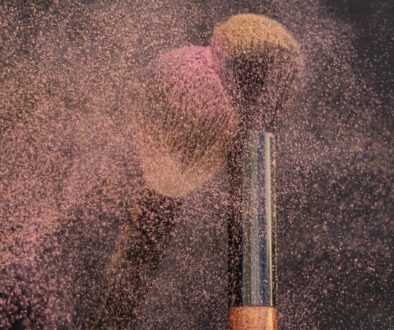How to Properly and Safely Store Makeup Brushes to Prevent Bacteria and Skin Issues

Makeup Brushes: Why Storage Could Be More Harmful Than You Think
We all know the importance of cleaning our makeup brushes, but how often do we think about where we store them? According to a recent study conducted by Spectrum Collections, the storage location of your makeup brushes may be just as important as regular cleaning—if not more. The study, which swabbed both clean and dirty brushes stored in a variety of common locations, found that bacteria levels on the brushes were equal to or higher than those on a toilet seat. Yes, you read that correctly. The very tools we use to apply makeup could be a breeding ground for harmful bacteria, which can lead to skin issues ranging from acne to more serious infections.
The Study: Bacteria Everywhere
Spectrum Collections, a renowned cosmetic tools brand, swabbed makeup brushes after they had been used for two weeks. Researchers tested brushes that were stored in a variety of places, including a bedroom vanity, makeup bags, brush-specific bags, drawers, and bathroom holders. In every case, the bacteria count was shockingly high. Some locations even showed more bacterial growth than a toilet seat. This alarming discovery highlights that the mere act of storing makeup brushes in these areas—without regular cleaning—can contribute to a build-up of bacteria.
Cosmetic scientist Carly Musleh, who worked with Spectrum Collections on the study, explains that makeup brushes can easily become contaminated with bacteria, oils, and dead skin cells. “While not all types of bacteria are harmful, using dirty brushes regularly could upset the healthy balance of your skin’s microbiome,” she says. “This can lead to issues like acne, and in some cases, more serious infections like impetigo or Staphylococcus (Staph) infections.”
The Risk of Dirty Brushes
When makeup brushes are not cleaned regularly, they become a vehicle for transferring bacteria and other pathogens to your skin. This is particularly concerning when you consider that makeup brushes are often used to apply makeup directly to sensitive areas like the face, eyes, and lips. Dirty brushes can lead to clogged pores, breakouts, and irritation, and in some cases, can even cause eye infections, especially if bacteria is transferred from the brushes to the eyes.
The study also revealed that improper storage can exacerbate the problem. Many people store their makeup brushes in environments like bathrooms, where moisture and humidity create the perfect conditions for bacterial growth. Even seemingly clean locations, like a vanity or drawer, can lead to bacterial buildup if brushes are left unwashed for too long.
Consumer Habits: A Wake-Up Call
The Spectrum Collections survey revealed another concerning statistic: 40% of customers claimed they clean their brushes every two weeks, but a staggering 20% admitted to washing them only once every one to three months. This finding is a wake-up call for many makeup users who may be underestimating the importance of routine brush hygiene.
Regular cleaning is essential for preventing bacterial buildup, but storage habits also play a critical role. “To reduce the build-up of bacteria, it is important to clean makeup brushes regularly, but also to store them in a clean, dry environment,” says Musleh. “Keeping brushes in a bathroom holder or makeup bag may not be ideal, as these areas can trap moisture and increase bacterial growth.”
The Importance of Proper Storage
The Spectrum Collections study suggests that, in addition to regular cleaning, makeup brushes should be stored in a cool, dry place to prevent bacterial growth. Ideally, brushes should be kept in a brush-specific holder or an area with good airflow, away from damp, high-humidity environments like the bathroom. If you must store brushes in a bag, choose one with adequate ventilation to reduce moisture buildup.
Furthermore, cleaning your brushes doesn’t have to be a hassle. While it’s essential to clean them thoroughly with soap or a brush cleanser, you can also use quick-drying options like brush wipes for a fast, on-the-go solution. Cleaning your brushes after each use can help to keep bacteria at bay and ensure that your skin stays clear and healthy.
Supporting Research: The Risks of Dirty Tools
The issue of dirty makeup tools has been well-documented in scientific research. A study published in the Journal of Applied Microbiology in 2016 found that makeup brushes and sponges can harbor a range of harmful bacteria, including Staphylococcus aureus, a pathogen that can cause skin infections. Similarly, research published in The International Journal of Cosmetic Science in 2019 highlighted that makeup brushes often become contaminated with both bacteria and fungi, especially when stored in warm, damp environments like bathrooms.
These findings reinforce the message that proper cleaning and storage of makeup brushes is essential not only for maintaining healthy skin but also for reducing the risk of infection. The accumulation of bacteria on makeup tools is a serious issue, but with proper care, it can be easily mitigated.
Conclusion: Small Habits, Big Impact
The results of Spectrum Collections’ study serve as a reminder that makeup brushes require more than just a quick swipe of cleanser to remain hygienic. Both storage and cleaning are equally important in ensuring that your tools don’t compromise your skin health. Regular cleaning of brushes, along with proper storage in dry, clean environments, will help reduce bacterial growth and ensure that your makeup routine doesn’t lead to unwanted skin problems.
Ultimately, the key takeaway is this: it’s time to rethink how we care for our makeup tools. A little extra effort in cleaning and storage can go a long way in protecting your skin from the harmful effects of bacterial buildup. With proper hygiene practices, you can continue to enjoy flawless makeup without the risk of skin irritation, breakouts, or infections.
For more information on the study and to explore Spectrum Collections’ range of makeup tools, visit their official blog.

